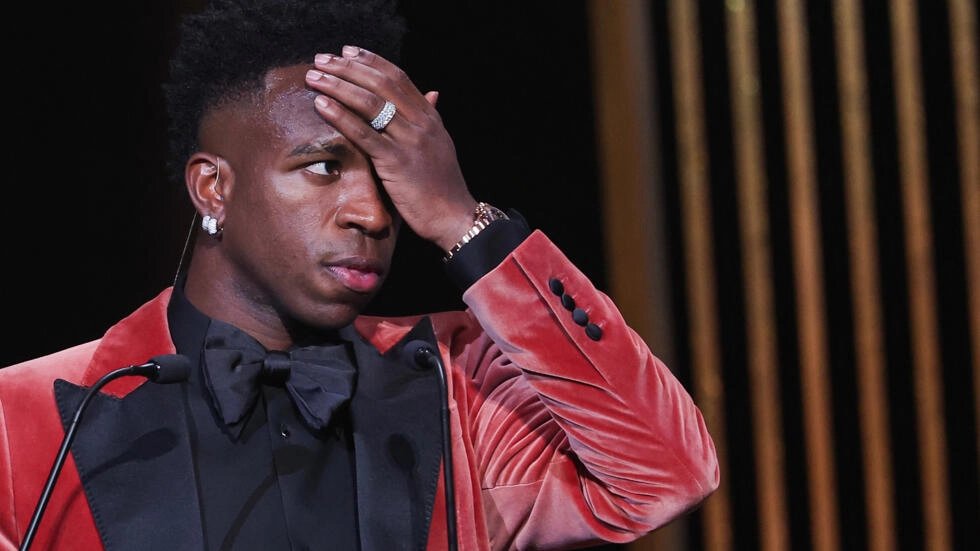Spain
Madrid Coach Ancelotti Acknowledges Vinicius’ Familiarity With Racism In Spain

Madrid Coach Ancelotti Acknowledges Vinicius’ Familiarity With Racism In Spain:
Spanish football has been plagued by racism again, with Brazilian player Vinicius facing racist abuse for two seasons. Recent Barcelona and La Liga investigations highlight the issue’s significance and black players’ ongoing struggles.
Super Deporte, a Valencian daily, aimednicius and expressed their satisfaction with racial connotations on its front cover this week. The association of Vinicius with Pinocchio shows how pervasive racial racism is in sports media.
Despite anti-racism programs and awareness, black athletes are still targeted, reminding us that more needs to be done. Vinicius’ recent evidence in a Spanish court on Valencia’s Mestalla stadium’s racist abuse highlights the necessity for more comprehensive stadium racism prevention measures.
Coach Ancelotti’s Resolute Stance
Real Madrid’s coach, Carlo Ancelotti, told the media about Vinicius’ resilience. Sadly, Ancelotti said that Vinicius has gotten used to racist insults, highlighting the culture’s structural faults. The coach underlined Vinicius’ focus on the game and effort, saying racism shouldn’t dissuade him. Ancelotti’s unwavering support for Vinicius calls for football unity against racism.
Renewed Contracts And Redoubled Commitments
Real Madrid’s commitment to player support was shown when Vinicius and Rodrygo Goes signed new contracts despite off-field difficulties. The 2027 and 2028 extensions reflect a long-term commitment to players’ careers and health.
Ancelotti projected a goal-scoring comeback for both. Vinicius and Rodrygo’s athleticism transcends race. These events show that Spanish football’s battle against racism requires collaboration, education, and a dedication to creating an inclusive and respectful sports environment for all players.
Racial Adversity On The Pitch And Beyond
Vinicius’s racial hardship illustrates a social problem beyond sports. The incidences of subtle and overt racist abuse remind us that football, although hailed as a worldwide language, is not immune to society’s deep-seated biases.
A renowned newspaper’s racist depiction of Vinicius shows insensitivity and highlights the need for a more profound discourse about racism in media coverage. The interplay of race, athletics, and media is complicated, and Vinicius’s recent occurrences raise questions about how narratives build and perpetuate damaging stereotypes.
Football wants to be a catalyst for good change; therefore, tackling racial hardship demands urgent stadium action and a consistent commitment to confront and deconstruct systematic inequalities in every aspect of the sport. Vinicius’ struggles remind us that racism is a constant on and off the game.
Read Also: Confronting Racism In Football: Spain’s Imperative Journey Through History
A Call For Collective Responsibility
As Vinicius continues to face prejudice, the football community is demanding collective accountability. Coaches, players, officials, and fans must denounce racist abuse and promote diversity.
Coach Ancelotti’s anti-racism stance inspires the football community. He supports Vinicius beyond the coach-player connection, stressing unity against prejudice. Ancelotti’s statements reinforce the idea that no player should face the weight of racist abuse alone; it’s a communal obligation to keep the beautiful game safe and inclusive.
Vinicius and Rodrygo’s contract extensions show more than a devotion to their professions. They offer the club’s dedication to fighting prejudice and helping players of all races succeed. Other clubs should follow suit and take action to eradicate racism in the sport.
Looking Ahead: Challenges And Opportunities
As Real Madrid prepares for matches, Vinicius’ racist story raises questions about football’s future. The occurrences remind us that although progress has been made, a fully inclusive and anti-racist football culture is still far from being achieved.
Young players like Jude Bellingham, who has impacted on and off the field, show that the sport can improve. Bellingham’s success proves that skill transcends race and class. His successes highlight the necessity for ongoing efforts to make such success stories the rule rather than the exception.
Looking forward, the football community must continue to fight prejudice, conduct educational initiatives, and create an atmosphere where players can grow without fear. Challenges are significant, but chances for good change are immense, needing a unified and persistent effort from all stakeholders in the beautiful game.
Social Media’s Role In Amplifying Awareness
In an age of social media, Vinicius’ racist abuse on the pitch has also been echoed online. Twitter, Instagram, and others may promote good and bad themes. How can these platforms encourage awareness, education, and, most crucially, a zero-tolerance racism policy?
The football community and social media companies must address racist harassment in stadiums and online. Educating the public, challenging prejudices, and encouraging open talks about racism may alter things. The football community can make the internet a better place for players like Vinicius by actively fighting racist harassment.
International Solidarity And The Global Fight Against Racism
Vinicius’ racist incidents have sparked worldwide and Spanish football community discussions. Vinicius’ support following racist insults at Valencia’s Mestalla stadium shows worldwide unity against racism.
Global football players, fans, and organizations must denounce racial injustice and promote sustainable change. Vinicius’ narrative discusses football’s role in solving social problems, transcending boundaries, and underlining the shared duty to build a more inclusive and equal society.
FIFA and UEFA shape football racist debate. Their strict procedures, rigorous investigations, and anti-racist actions may establish a pattern for the worldwide football ecosystem. As the world watches, football racism becomes a global issue and a shared commitment to sports justice.
Lessons For The Future Generation
Vinicius’ struggles may teach essential things to future players, fans, and society. As awful as racism is, it reminds us of the significance of education, empathy, and aggressive actions to overcome it.
Football clubs, academies, and schools may shape youth values. Anti-racism teaching in football training, schools, and communities may help create a more accepting culture. By allowing the next generation to detect and fight prejudice, the football community can create a more peaceful and accepting environment on and off the field.












You must be logged in to post a comment Login